

Is bushfire smoke bad for your health? Bushfire smoke has continued to intermittently shroud some of Australia's major cities as bushfires rage around the country.
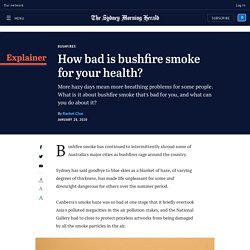
Sydney has said goodbye to blue skies as a blanket of haze, of varying degrees of thickness, has made life unpleasant for some and downright dangerous for others over the summer period. Canberra's smoke haze was so bad at one stage that it briefly overtook Asia's polluted megacities in the air pollution stakes, and the National Gallery had to close to protect priceless artworks from being damaged by all the smoke particles in the air.
In Melbourne, the smell of smoke peaks when the wind dies down and the temperature rises, causing smoke bands higher in the atmosphere to descend on the city and suburbs. In January, residents were breathing smoke from fires burning in East Gippsland, along with smoke from NSW and from as far away as Western Australia, said the state's chief health officer, Brett Sutton. Bushfire smoke harms the lungs like cigarette smoke. Bushfire smoke can damage the lungs in a similar way to smoking-related emphysema, according to a study from the Woolcock Institute of Medical Research.
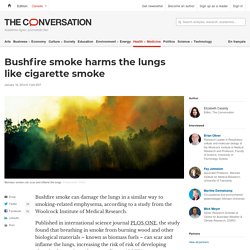
Published in international science journal PLOS ONE, the study found that breathing in smoke from burning wood and other biological materials – known as biomass fuels – can scar and inflame the lungs, increasing the risk of risk of developing chronic obstructive pulmonary disease (COPD). COPD is the umbrella term for lung diseases including emphysema, chronic bronchitis and chronic asthma, and affects one in 13 Australians aged 40 and over.
Cigarette smoke is the primary cause of the disease. The researchers measured inflammation and scarring on human lung cells using tissue from 26 donors. The tissue was exposed to increasing concentrations of biomass smoke extract, collected from a burning tree, over 72 hours. “It would be incorrect to say that someone who has been around a bushfire once is going to develop a horrible disease. Pregnant women should take extra care to minimise their exposure to bushfire smoke. Smoke haze from Australia’s catastrophic bushfires is continuing to affect many parts of the country.
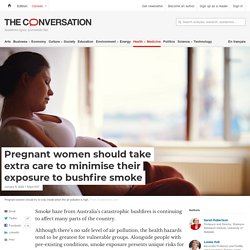
Although there’s no safe level of air pollution, the health hazards tend to be greatest for vulnerable groups. Alongside people with pre-existing conditions, smoke exposure presents unique risks for pregnant women. Research shows prolonged exposure to bushfire smoke increases the risk of pregnancy complications including high blood pressure, gestational diabetes, low birth weight and premature birth (before 37 weeks). These conditions can have short-term and lifelong effects on a baby’s health, with increased risk of conditions including cerebral palsy and visual or hearing impairment.
Even babies born only a few weeks early can experience learning difficulties and behavioural problems, and have an elevated risk of heart disease in later life. Our buildings aren't made to keep out bushfire smoke. Here's what you can do. In early December 2019, a Sheffield Shield cricket match between NSW and Queensland was played in bushfire smoke so thick that the ball was at times invisible to the spectators.
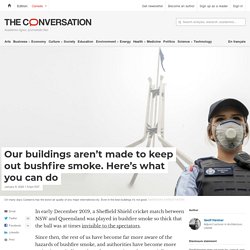
Since then, the rest of us have become far more aware of the hazards of bushfire smoke, and authorities have become more active in reminding us how dangerous it can be, especially during exercise. A standard piece of advice is to “spend more time indoors”. But does it work? Up until this year, with bushfire smoke lasting only a few days, it was good advice, especially for buildings that rely on recirculated and filtered mechanical ventilation complying with Australian Standard 1668 Part 2. These buildings include shopping malls, cinemas, hospitals, larger offices and some of the buildings in some universities.
It’s fine in cinemas, for a while… Staff. From face masks to air purifiers: what actually works to protect us from bushfire smoke? Bushfire smoke has now been blanketing parts of Australia for months.
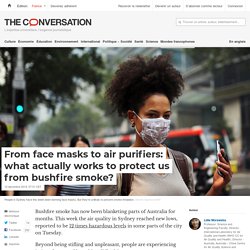
This week the air quality in Sydney reached new lows, reported to be 12 times hazardous levels in some parts of the city on Tuesday. Beyond being stifling and unpleasant, people are experiencing irritated eyes and breathing difficulties. Statistics emerging from hospital records show an increase in emergency hospital admissions for a range of diseases from asthma to heart disease and stroke. We’ll only fully understand the longer term health effects in the weeks and months to come. When the situation is as bad as it has been in Sydney over the past few days, people stop asking questions about whether air pollution has an impact on health; we know it has.
À lire aussi : Now Australian cities are choking on smoke, will we finally talk about climate change? Does staying indoors help? DEA - Article. Doctors for the Environment Australia calls for a federally coordinated national meeting to direct action in response to the unprecedented public health threat from months of bushfire smoke in eastern Australia.
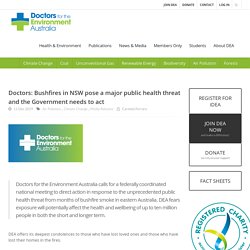
DEA fears exposure will potentially affect the health and wellbeing of up to ten million people in both the short and longer term. DEA offers its deepest condolences to those who have lost loved ones and those who have lost their homes in the fires. Bushfires are engulfing large areas of the east coast of Australia. Two million hectares have burnt, including more than 10% of our national parkland. DEA - Article. Doctors for the Environment Australia is today joining a coalition of Australia’s major health and medical groups in declaring hazardous air pollution from bushfire smoke in Sydney and other areas in NSW a public health emergency.
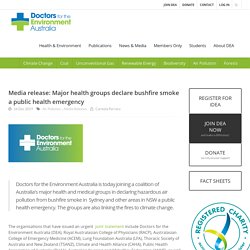
The groups are also linking the fires to climate change. The organisations that have issued an urgent joint statement include Doctors for the Environment Australia (DEA), Royal Australasian College of Physicians (RACP), Australasian College of Emergency Medicine (ACEM), Lung Foundation Australia (LFA), Thoracic Society of Australia and New Zealand (TSANZ), Climate and Health Alliance (CAHA), Public Health Association of Australia (PHAA), Australian Nursing and Midwifery Federation (ANMF), as well as 14 other groups.
Spokesperson for DEA and emergency specialist Dr Lai Heng Foong says bushfires fuelled by worsening climate change have produced an unprecedented level of air pollution. “Ash from the bushfires is also polluting water supplies. Is bushfire smoke bad for your health? Poor air quality caused by bushfire smoke posing serious risk for healthy people too, health experts warn - Health - ABC News. Doctors are warning even healthy people could develop serious illnesses, because of the smoke haze that's blanketed parts of the country, including some of our major cities, for weeks on end.
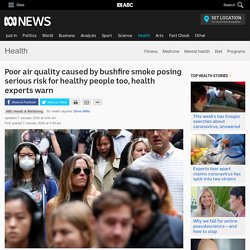
The Australian Medical Association (AMA) has warned prolonged exposure to toxic smoke could affect the health of many Australians. In a statement released late last week, AMA president Tony Bartone described the length and density of smoke exposure as "a new, and possibly fatal, health risk" most of us have never faced before. "With denser smoke haze and longer periods that people endure smoke inhalation, there is a much higher risk that previously healthy people will face developing serious illness," Dr Bartone said. Australia's bushfire crisis has killed at least 20 people, destroyed or damaged at least 2,000 homes, and led to emergency declarations in two states. Air quality in Canberra recently reached more than 22 times the hazardous rating.
Long term effects of bushfire smoke not clear: Chief Medical Officer - AM - ABC Radio. KIM LANDERS: So many towns and cities have been cloaked in bushfire smoke this summer.
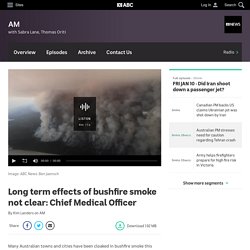
At times, Sydney, Melbourne and Canberra have all recorded the worst air quality in the world but experts say it might be years before we know the long term health effects. To discuss this, I spoke earlier to the acting Chief Medical Officer of Australia, Professor Paul Kelly. Professor Kelly, are the bushfires posing a public health emergency?
Bushfire smoke and babies - Health Report - ABC Radio National. Norman Swan: In what has been a terrible bushfire season so far, with appalling air quality, the focus has been on adults and their issues with the air.
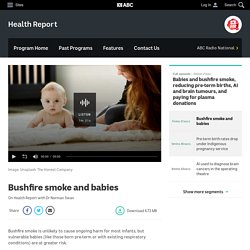
But what about babies, including babies yet to be born? The respiratory medicine department at the Royal Children's Hospital in Melbourne has a many-decade-long international reputation for its work on infant lung problems, and this has been picked up by the Murdoch Children's Research Institute at the hospital. Sarath Ranganathan is head of respiratory medicine at the Royal Children's and heads the research group at the Murdoch. Welcome to the Health Report, Sarath. Pollution experts team up to propose major new study into health impacts of bushfire smoke.
Updated 14 Jan 2020, 10:13amTue 14 Jan 2020, 10:13am Australia's top pollution experts are teaming up to propose a major new study into the long-term health impacts of bushfire smoke. Key points: A team of Australian academics is seeking funding to study the health impacts of bushfire smokeA previous study looked at the effects of 45 days of smoke inhalationThat study found pregnant women were more likely to contract gestational diabetes.
How does poor air quality from bushfire smoke affect our health? New South Wales and Queensland are in the grip of a devastating bushfire emergency, which has tragically resulted in the loss of homes and lives. But the smoke produced can affect many more people not immediately impacted by the fires – even people many kilometres from the fire. The smoke haze blanketing parts of NSW and Queensland has seen air quality indicators exceed national standards over recent days. Read more: Firestorms and flaming tornadoes: how bushfires create their own ferocious weather systems However, these are long-term studies looking at what happens over a person’s life with prolonged exposure to air pollution. With bushfire-related air pollution, air quality is reduced for relatively short periods. But it’s still worth exercising caution if you live in an affected area, particularly if you have an existing health condition that might put you at higher risk.
Air quality standards. I'm struggling to breathe with all the bushfire smoke – could I have undiagnosed asthma? As bushfire smoke continues to pollute the air of large parts of Australia’s eastern states, some people have experienced throat irritation, coughing and breathing difficulties. Health authorities have also warned more severe symptoms such as chest tightness and wheezing may emerge in people who have underlying asthma and in people who haven’t yet been diagnosed. Wheezing is a high-pitched whistling sound when you breathe, caused by muscle spasm or inflammation in narrowed airways.
Early Life Wildfire Smoke Exposure Is Associated with Immune Dysregulation and Lung Function Decrements in Adolescence. The impact of exposure to coal mine fire smoke in utero and... : Environmental Epidemiology. TPS 684: Long-term health effects of air pollutants 1, Exhibition Hall, Ground floor, August 26, 2019, 3:00 PM - 4:30 PM Background/Aims: In 2014 a coal mine fire exposed an Australian community to high smoke concentrations over six weeks. The longer-term health impacts of such exposure in utero and in early childhood are unknown. Existing evidence suggests that increased risks of respiratory disease and allergies are plausible.
Long term exposure to ambient fine particulate matter and incidence of stroke: prospective cohort study from the China-PAR project. Data collection For all subcohorts we used identical methods at baseline and follow-up surveys. Trained healthcare staff used a standardized questionnaire under strict quality control to collect information on personal characteristics, medical history, and lifestyle risk factors. Smoking was defined as having consumed at least 400 cigarettes or 500 g of tobacco leaves throughout the lifetime, or at least one cigarette daily for one year or more. We categorized participants into never, former, and current smokers. Current smokers were defined as those who were smoking at the time of survey, and former smokers were those who ever smoked but had quitted at the time of survey. Trained healthcare practitioners measured participants’ blood pressure during clinic or home visits in accordance with the protocol recommended by the American Heart Association.17 Three measurements were obtained after participants had rested for five minutes.
Smoke and your health. Bushfire smoke could cause lung problems for generations, US monkey study suggests. Updated 29 Jan 2020, 3:05amWed 29 Jan 2020, 3:05am. Wildfire smoke may cause life-long harm. Image copyright AFP. UC Davis Researching Impact Of Wildfire Smoke On Pregnancies. UC DAVIS (CBS13) — UC Davis researchers continue taking a closer look at the effects of October’s firestorms, this time focusing on pregnant women. Maternal exposure to fine particulate matter from a coal mine fire and birth outcomes in Victoria, Australia. 1. Research Summary ELF Exposure to mine fire smoke and the risk of pregnancy related health problems. Gestational diabetes. Gestational diabetes mellitus (sometimes referred to as GDM) is a form of diabetes that occurs during pregnancy. Most women will no longer have diabetes after the baby is born. However, some women will continue to have high blood glucose levels after delivery.
It is diagnosed when higher than normal blood glucose levels first appear during pregnancy. Gestational diabetes is the fastest growing type of diabetes in Australia, affecting thousands of pregnant women. Between 12% and 14% of pregnant women will develop gestational diabetes and this usually occurs around the 24th to 28th week of pregnancy. Hazelwood Health Study - Hazelwood Health Study. Research Summary ELF Exposure to mine fire smoke and the risk of pregnancy related health problems.
What you can do about the health impact of bushfire smoke. In recent days, we’ve seen dramatic pictures of thick smoke from bushfires hanging over Sydney. Our first thoughts are with people living in the immediate vicinity of the fires, and the threat to their lives and properties. Smoke haze and how to minimise the impact - The Fifth Estate. OXYGEN FILES: Usually in January, there are kids everywhere in my little Riverina town. What are Australia's bushfires doing to our bodies? - AM - ABC Radio.
Bushfire smoke is everywhere in our cities. Here's exactly what you are inhaling. As bushfire smoke blankets large parts of Australia, it’s time to examine what this complex chemical mixture is made of, to better understand what it’s doing to both our bodies and the planet. I research the chemical processes that create pollutants in flames, and what happens when they are released into the air we breathe. 201912 CAR factsheet Bushfire Smoke and Health. What was actually in the air you were breathing during the bushfire haze? Posted 10 Mar 2020, 7:43pmTue 10 Mar 2020, 7:43pm Rachael Neumann was six months pregnant with her first child when the smoke in Canberra was at its worst this January.
Nitrogen dioxide (NO2) - Air quality fact sheet. Australia's bushfires have emitted 250m tonnes of CO2, almost half of country's annual emissions. Bushfire smoke and your health. 7.30. Bushfire smoke and babies - Health Report - ABC Radio National. Murdoch Children's Research Institute. Pregnant women should take extra care to minimise their exposure to bushfire smoke. 201912 CAR factsheet Bushfire Smoke and Health. 7.30. Pregnant women, children and bushfire smoke. Australia fires: Health impacts from bushfire smoke won't be known for years, experts say. RANZCOG - Statement on prolonged exposure to bushfire smoke and poor air quality.
Short and Long-Term Effects of Preterm Birth. Will Sydney's bushfire smoke pollution have long-term health effects? What are Australia's bushfires doing to our bodies? - AM - ABC Radio. Poor air quality caused by bushfire smoke posing serious risk for healthy people too, health experts warn - Health - ABC News. Brian Oliver: Lung scientist says Sydney haze equals ‘smoking 32 cigarettes’ How does bushfire smoke affect our health? 6 things you need to know.
Bushfire smoke is bad for your eyes, too. Here's how you can protect them. Explainer: How smoke impacts your health and how you can protect yourself - Hack - triple j. We know bushfire smoke affects our health, but the long-term consequences are hazy. How does bushfire smoke affect our health? 6 things you need to know. Bushfire smoke is bad for your eyes, too. Here's how you can protect them. Pregnant women should take extra care to minimise their exposure to bushfire smoke. Air pollution and female fertility: a systematic review of literature. Impact of Wildfire Smoke on Adverse Pregnancy Outcomes in Colorado, 2007–2015. Bushfire smoke harms the lungs like cigarette smoke. Poor air quality caused by bushfire smoke posing serious risk for healthy people too, health experts warn - Health - ABC News. Long term effects of bushfire smoke not clear: Chief Medical Officer - AM - ABC Radio. Our buildings aren't made to keep out bushfire smoke. Here's what you can do.
Smoke and bushfires are the new norm, so how do we beat the 'airpocalypse'? Should I wear a face mask to protect myself from bushfire smoke? - ABC News. Smoke haze and how to minimise the impact - The Fifth Estate. Dr Chris Zappala - air quality. 'Passive' home more expensive to build but cheaper to run, achieves highest bushfire risk rating. What was actually in the air you were breathing during the bushfire haze? Is bushfire smoke bad for your health? Bushfire smoke and your health. Explainer: How smoke impacts your health and how you can protect yourself - Hack - triple j. How to protect your children from wildfire smoke. Poor air quality caused by bushfire smoke posing serious risk for healthy people too, health experts warn - Health - ABC News. How does bushfire smoke affect our health? 6 things you need to know. Pregnant women should take extra care to minimise their exposure to bushfire smoke. 201912 CAR factsheet Bushfire Smoke and Health.
Accuracy of AirRater readings - AirRater. Protect yourself from bushfire smoke - Air quality. Bushfire Smoke and Your Health. Sydney smoke is infiltrating homes and it may be just as hazardous to stay indoors. From face masks to air purifiers: what actually works to protect us from bushfire smoke? Health concerns related to Victorian bushfires. House Energy Efficiency Inspect Proj. How to manage bushfire smoke haze health risks - Health - ABC News. Is bushfire smoke bad for your health?